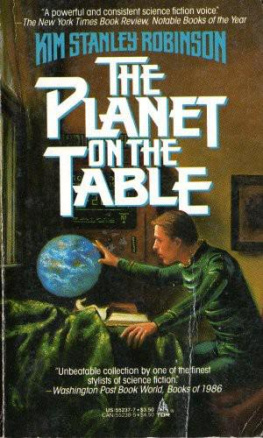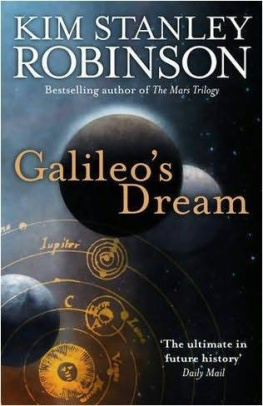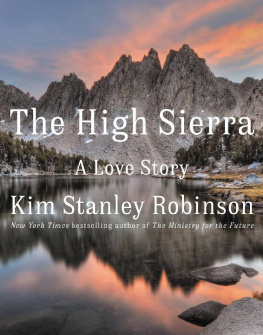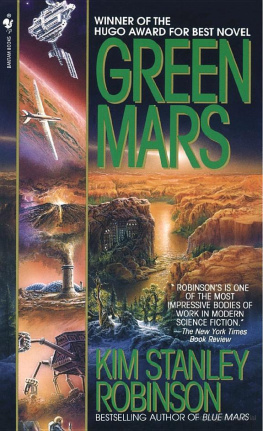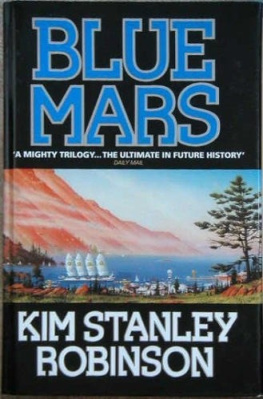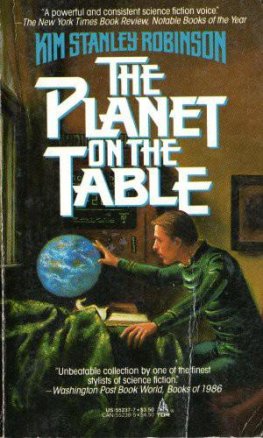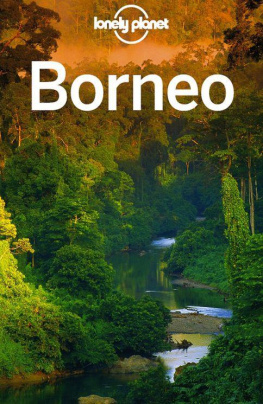Kim Stanley Robinson - The Planet on the Table
Here you can read online Kim Stanley Robinson - The Planet on the Table full text of the book (entire story) in english for free. Download pdf and epub, get meaning, cover and reviews about this ebook. year: 1986, publisher: Tor Books, genre: Detective and thriller. Description of the work, (preface) as well as reviews are available. Best literature library LitArk.com created for fans of good reading and offers a wide selection of genres:
Romance novel
Science fiction
Adventure
Detective
Science
History
Home and family
Prose
Art
Politics
Computer
Non-fiction
Religion
Business
Children
Humor
Choose a favorite category and find really read worthwhile books. Enjoy immersion in the world of imagination, feel the emotions of the characters or learn something new for yourself, make an fascinating discovery.
- Book:The Planet on the Table
- Author:
- Publisher:Tor Books
- Genre:
- Year:1986
- Rating:5 / 5
- Favourites:Add to favourites
- Your mark:
- 100
- 1
- 2
- 3
- 4
- 5
The Planet on the Table: summary, description and annotation
We offer to read an annotation, description, summary or preface (depends on what the author of the book "The Planet on the Table" wrote himself). If you haven't found the necessary information about the book — write in the comments, we will try to find it.
Kim Stanley Robinson: author's other books
Who wrote The Planet on the Table? Find out the surname, the name of the author of the book and a list of all author's works by series.
The Planet on the Table — read online for free the complete book (whole text) full work
Below is the text of the book, divided by pages. System saving the place of the last page read, allows you to conveniently read the book "The Planet on the Table" online for free, without having to search again every time where you left off. Put a bookmark, and you can go to the page where you finished reading at any time.
Font size:
Interval:
Bookmark:

This is a work of fiction. All the characters and events portrayed in this book are fictional, and any resemblance to real people or incidents is purely coincidental.
THE PLANET ON THE TABLE
Copyright 1986 by Kim Stanley Robinson
All rights reserved, including the right to reproduce this book or portions thereof in any form.
First printing: July 1986
A TOR Book
Published by Tom Doherty Associates
49 West 24 Street
New York, N.Y. 10010
ISBN: 0-312-93595-1
Library of Congress Catalog Card Number 85-52258
Printed in the United States
0 9 8 7 6 5 4 3 2 1
Acknowledgments
Venice Drowned 1981 by Terry Carr. Universe 11
Mercurial 1985 by Terry Carr. Universe 15
Ridge Running 1984 by The Mercury Press, The Magazine of Fantasy and Science Fiction
The Disguise 1977 by Damon Knight. Orbit 19
The Lucky Strike 1984 by Terry Carr. Universe 14
Coming Back to Dixieland 1976 by Damon Knight. Orbit 18
Stone Eggs 1983 by Terry Carr. Universe 13
Black Air 1983 by The Mercury Press. The Magazine of Fantasy and Science Fiction


In his poem The Planet On the Table, Wallace Stevens says,
Ariel was glad he had written his poems.They were of a remembered timeOr of something seen that he liked.This is remarkable in my experience of Stevens: three consecutive lines that I feel I understand. More than that, I understand the feeling in them; looking at the galleys of my first short story collection, I have that feeling myself, or at least Calibans version of it. I am glad that I have written these stories.
They were written over a period of about ten years. Some of them, as you will see, are strictly autobiographical; the rest are not. If you go on and read them, then you and I become collaborators in the strange and wonderful process that is reading fiction. My suggestion, as collaborator, is that you let some time lapse between the reading of one and the next. Perhaps one a day would be a good plan; most health experts and vitamin bottles agree on that schedule, and we want these stories a healthy as possible.
Stevens in his poem also says,
his poems, although makings of his self,Were no less makings of the sun.Thats a science-fictional thought, isnt it? Our star blasts a barren planet with intense radiation; and one of the results is this recombinant string of sentences. Of course there were some intermediate steps along the way: the primordial soup the dinosaurs the suns radiation that I took on directly, as a child on the California beaches Or my education, the passing to me of a tradition, and some parts of a craft. This step in the movement from sun to sentence is an important one. I have been very lucky in my teachers, very lucky indeed, and I would like to thank some of them here, in San Diego, Donald Wesling, Fredric Jameson, Andrew Wright, Jack Behar, Lowry Pei, and Ursula K. Le Guin. In Boston, John Malcolm Brinnin and Charles F. Stone. In East Lansing, Samuel R. Delany, Gene Wolfe, Roger Zelazny, Joe Haldeman, Damon Knight, and Kate Wilhelm. And before these, pointing the way, Catherine Lee. I owe these people a lot.
While Im at it, I should mention the editors who first published these stories. If you are a professional writer, then the editors buying stories in your time create a field of play, bounded by a set of subtle but real constraints, which determine what you can write and still reasonably expect to sell. As you will see if you check the Acknowledgments page, all of the stories in this collection originally appeared in Orbit , in Universe , or in The Magazine of Fantasy and Science Fiction , which means I was selling them to Damon Knight, Terry Carr, or Ed Ferman. These three editors between them created a field of play so large that I felt free to wander off on my own, even to get lost out in the woods; and that is a wonderful freedom indeed. My thanks to these three gentlemen, fine editors all.
On the day that I got the galleys fur this collection, I was living in Zrich, Switzerland. Feeling pleased to see all these strays gathered in one book, I decided to go for a run. It was January, and snowing outside, so I put on my green Goretex mountain suit, and pulled the hood up over the headphones of my Sony Walkman, and took off into the streets. Did I look a little out of place there in Zrich, Switzerland? You bet I did. I had chosen Beethovens Third Symphony to listen to; for many of the years when I was writing the stories in this collection, Beethovens Eroica had started off every single day, so it seemed appropriate. I got the volume up to a level where I could share the music a bit with the people that I passed, and the first movement began to propel me along.
Zrich lies in the valley were the Limmat River leaves the Zrichsee, and on the hills to east and west of this valley. I lived on the hillside to the east, and the top of the hill, the Zrichberg, is forested, and cut with old horsetrails; I headed up in that direction. Soon I was running on the path bordering the trees, and looking out to the west I could see the fat streak-bottomed clouds blowing in over the city, and over the pewter surface of the Zrichsee, headed right at me. The wind was pushing the tall trees back and forth, and tearing off the last of their red leaves, and making such a roar in the branches that I could hear it all round the edges of the Beethoven.
Happy at the storminess of this storm, and my little moment of being within it, I ran over the horsetrails on the Zrichberg until I came to the Friederhof Fluntern, the cemetery on the south flank of the hill. Paths wound here and there among the gravestones, not the most appropriate place to be running around, but I had the place to myself, so I kept it up. Step, step, step, up some snowy stairs, running shoes soaked, and I came upon the statue of a seated man. Well, I thought, looking at the familiar face: if it isnt James Joyce!
And so it was. I had to scrape the snow off the memorial stone, set flat in the ground, but there it was: JAMES JOYCE Geboren 2 Februar 1882 Gestorben 13 Januar 1941 . Nora and their son George were buried in the plot as well.
The statue was an excellent one, of bronze that had darkened till it looked like iron: Joyce sitting on a block, legs crossed, elbow resting on knee, open book in one hand, cigarette in the other. Thorny walking stick leaning against him. He looked off to the side, contemplatively, through thick bronze glasses. There was an icicle hanging from one elbow, and he wore a shawl of snow.
I was well-warmed by my run up the hill, and surprised by this unexpected meeting, I sat on the low wall across from the statue. Just to hang out with him for a while, you know. I took off the headphones, turned off the Walkman. Snow drifted onto us, big flakes falling slowly sideways, and we were alone in a small white world.
James Joyce. I had always thought of him as a kind of iron man: hard on his family, hard on his friends, hard on his creditors; hard on his readers. So I wasnt really very surprised when his neck squeaked an iron kind of squeak, and his head turned to face me. So, he said, a bit like a ventriloquist, youve got a story collection coming out. Even after all these years of exile his voice had a touch of the Irish in it.
Yes! I cried. Youve beard! Have you read it?
Next pageFont size:
Interval:
Bookmark:
Similar books «The Planet on the Table»
Look at similar books to The Planet on the Table. We have selected literature similar in name and meaning in the hope of providing readers with more options to find new, interesting, not yet read works.
Discussion, reviews of the book The Planet on the Table and just readers' own opinions. Leave your comments, write what you think about the work, its meaning or the main characters. Specify what exactly you liked and what you didn't like, and why you think so.

